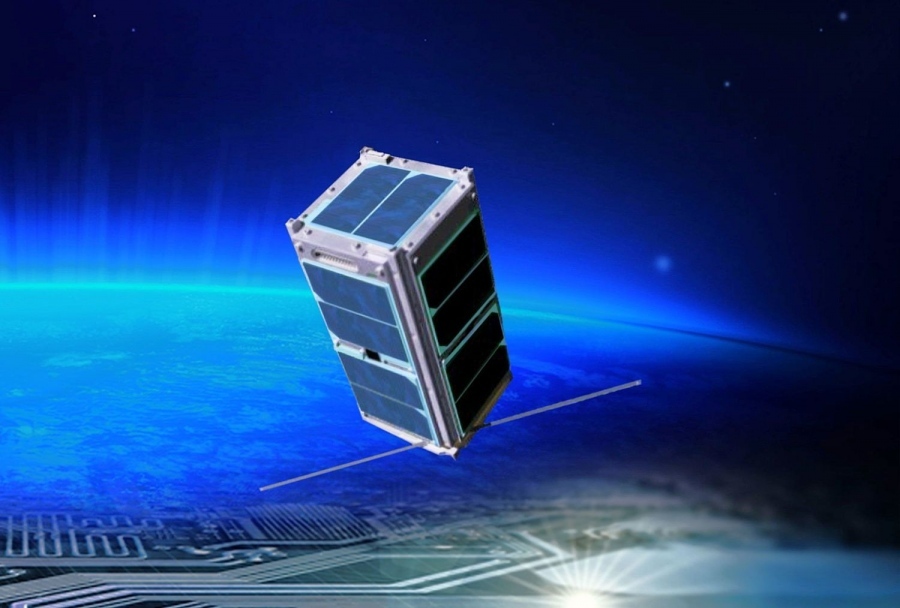The Greek satellite MICE 1 from Alexandroupoli, ready for space with Elon Musk’s company

The nanosatellite, named MICE 1, does not have cameras pointed towards Earth, because the construction is small and the cost of a camera exceeds 5 million euros.
On November 11 from Florida, USA, barring unforeseen circumstances, the first private Greek nanosatellite will be launched into space.
The scientific achievement comes from a “small” company, Prisma Electronics S.A., based in Alexandroupoli, but “big” in technological matters that make it stand out.
Weather permitting, the nanosatellite, with dimensions of 30 cm x 10 cm, will be placed in the rocket’s cone along with other “small” and two large satellites.
The launch will be conducted by Elon Musk’s SpaceX company. The American company gives a 99.1% probability that the launch will be successful, meaning it will be located and operate. After the launch, the nanosatellite will enter a stable orbit in space, where it must be located within three months.
From the time of location, it must be certified in the following six months that all systems are operating at the desired level.
The cost, including the launch, amounts to 1 million euros, a high figure for “Prisma,” given that the annual turnover was 10 million euros in 2024.
The nanosatellite, named MICE 1, does not have cameras pointed towards Earth, because the construction is small and the cost of a camera exceeds 5 million euros.
Shipping will utilize the satellite
The purpose of MICE 1 is to communicate with ocean-going vessels traveling in the oceans.
The ships already possess the LAROS platform, which holds all the ship’s data. With the cooperation of MICE 1, this data will be sent to the management of shipping companies for utilization. The data is of critical importance to Greek shipping, which dominates the global transport map.
Mr. Christos Giordamlis, CEO of Prisma Electronics S.A., said that MICE 1 has many capabilities, but in the present phase, it covers the maritime navigation service. This answer was given when asked whether “Prisma” would accept a request from the Ministry of Maritime Affairs and Insular Policy to monitor fishing boats in Greek waters.
He pointed out that “the launch of MICE-1 marks a new chapter for Greek technology and the participation of Prisma Electronics in the European space domain. It is the result of years of effort, collaboration, and dedication from the entire Prisma Electronics team, which managed to transform an ambitious idea into a tangible achievement. It is where the dream becomes reality, with funding from ‘GREECE 2.0,’ the Greek Government, and the European Commission, under the auspices of the Ministry of Digital Governance and according to the guidelines and instructions of the European Space Agency.”
“MICE-1 is not only the first Greek nanosatellite designed for operational exploitation, the first mission of a Greek company in collaboration with a Greek university—the Democritus University of Thrace—it is a symbol of our country’s ability to innovate, cooperate, and offer solutions with a real impact on maritime affairs and the environment, in the modern monitoring of important structures. We are proud to contribute to the European space effort, bringing Greece closer to space, to a more sustainable future and a safer planet for shipping and people.”
Nikos Theodoropoulos
[email protected]
www.bankingnews.gr
Οι απόψεις που εκφράζονται στα σχόλια των άρθρων δεν απηχούν κατ’ ανάγκη τις απόψεις της ιστοσελίδας μας, το οποίο ως εκ τούτου δεν φέρει καμία ευθύνη. Για τα άρθρα που αναδημοσιεύονται εδώ με πηγή, ουδεμία ευθύνη εκ του νόμου φέρουμε καθώς απηχούν αποκλειστικά τις απόψεις των συντακτών τους και δεν δεσμεύουν καθ’ οιονδήποτε τρόπο την ιστοσελίδα.




